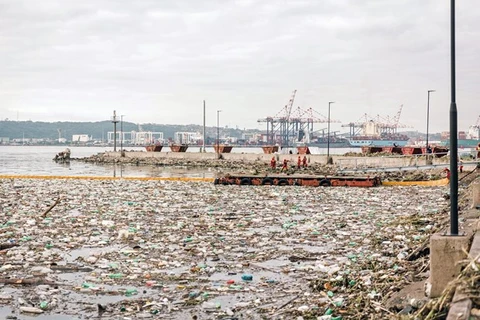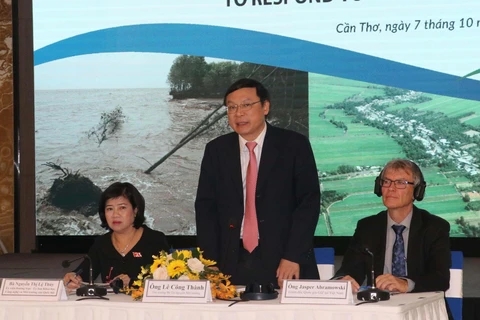 Prof. David Dapice, Senior Economist, Vietnam and Myanmar Programme, Harvard Kennedy School, at the meeting with leaders of Can Tho city on October 8. (Photo: VNA)
Prof. David Dapice, Senior Economist, Vietnam and Myanmar Programme, Harvard Kennedy School, at the meeting with leaders of Can Tho city on October 8. (Photo: VNA)Can Tho (VNA) – Rising sea levels and saltwater intrusion in the Mekong Delta are becoming alarming, said Prof. David Dapice, Senior Economist, Vietnam and Myanmar Programme, Harvard Kennedy School, at a meeting with leaders of Can Tho city on October 8.
The meeting between the municipal People’s Committee and a group of scientists from Fulbright University Vietnam and US-based Harvard University focused on discussing climate change and the city’s adaption policies.
Dapice said a study released by Utrecht University in the Netherlands shows that the Mekong Delta is subsiding 2 – 3 cm and its sea level is rising by about 0.5 cm per year, while the region is just 80 cm above sea level.
It is estimated that at these current rates, over 12 million people living in the region will be directly affected over the next 50 years if nothing is done, he said.
Harvard University is cooperating with Fulbright University Vietnam to assess the potential impacts of rising sea levels and saltwater intrusion on social welfare and economic development in the region.
This report is being conducted to prepare for an annual policy discussion between Harvard University and the government of Vietnam to be held in Massachusetts in early November. The discussion will recommend solutions and policies to address pressing issues currently facing the Vietnamese government. This year’s topics will be climate change and the environment.
Can Tho is known for its immense network of rivers and canals so the effects of climate change like high tides, drought and saline intrusion have direct impacts on the city, said Vice Chairman of the municipal People’s Committee Dao Anh Dung.
The hardest hit by high tides are the districts of Ninh Kieu, Binh Thuy and Cai Rang because the drainage systems in these areas are old, Dung said, adding that adequate drainage has not even been developed on many roads.
According to the local Department of Natural Resources and Environment, tide levels in Can Tho have surged over the past 15 years, from 1.93m in 2004 to 2.25m this year.
To cope with the high tides, the city has been implementing a World Bank-funded urban development and resilience project worth 7 trillion VND (301 million USD) from 2016 – 2021 to reduce floods and protect nearly 2,700 hectares of agricultural and residential land, and the livelihoods of 423,000 local people.
Can Tho has also taken various measures to enhance fresh water supplies for local production and daily activities, and is helping local farmers switch to drought tolerant crops.
Dapice spoke highly of Can Tho’s efforts to respond to climate change, suggesting the city’s environmental agencies should consider rainwater as a suitable source of water in the wake of declining water quality and volume due to the impacts of climate change./.
VNA






















